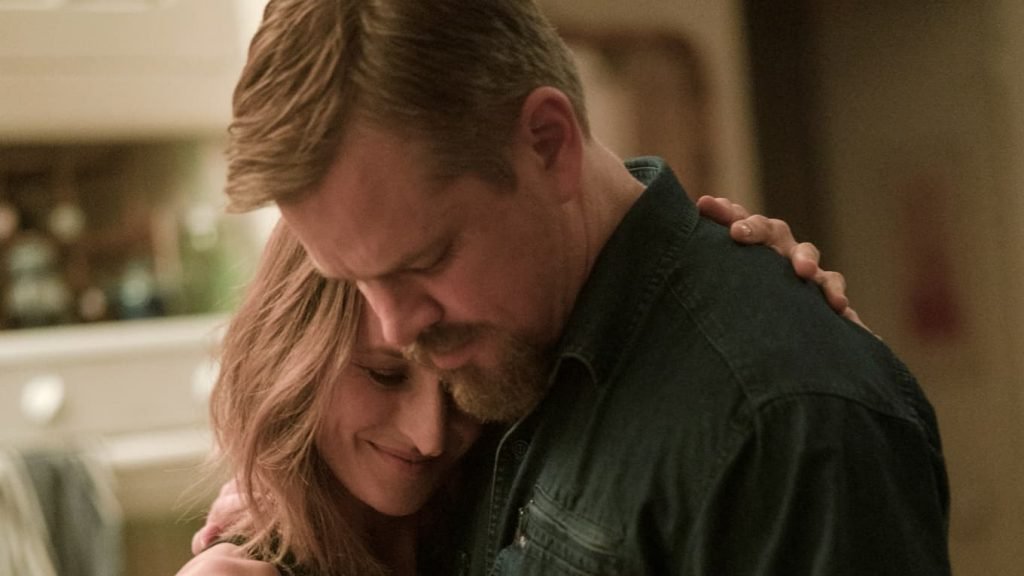Stillwater is so much more than its simple logline would lead you to believe, blending sentimentality with suspense to create a brutally captivating concoction.
In the six years since Spotlight, Oscar winner Tom McCarthy has made but one film – the family friendly Timmy Failure: Mistakes Were Made, which debuted on Disney+ last February. While positively received, fans of the writer-director couldn’t help but wonder when he’d return to prestige fare of his past, with a worthy successor to heavily praised projects like The Station Agent, The Visitor, and Win Win. However, the auteur’s admirers need worry no more, as, with the arrival of this year’s Stillwater, McCarthy is back and better than ever, crafting a complex yet continually compelling crime drama that defies basic description and shifts genres on a dime, handling every tonal transformation with effortless efficiency.
His story – loosely inspired by the Amanda Knox saga of the late 2000s – starts by spotlighting Matt Damon’s (Good Will Hunting, The Martian) Bill Baker, hard at work in his hometown of Stillwater, Oklahoma – a rough and rugged everyman who says little but carries himself in a way that suggests there’s far more to his history than meets the eye. Soon enough, that painful past reveals itself, as we witness Baker fly to France and meet his daughter Allison (Abigail Breslin, of Little Miss Sunshine and Miranda’s Victim) in a prison in Marseille. Quickly, we learn that Allison is halfway through a nine-year prison sentence, serving time for the murder of her girlfriend, Lena – a crime she insists she did not commit. Additionally, we find that Bill’s visits are frequent, as he’s made routine trips over the past five years to deliver supplies and news and such, in an attempt to fix his fraught relationship with his daughter. But this particular conversation changes things completely, as Allison offers Bill an unexpected new lead on her case that could exonerate her.
Eager to prove his worth and regain Allison’s trust, Bill aims to involve her former lawyer, but she refuses to re-open the case with such flimsy evidence. Still, Bill persists, taking matters into his own hands and confronting language barriers and cultural differences on an adventure across France to find the man who committed this murder and assert Allison’s innocence. Along the way, he recruits a French theater actress named Virginie (Camille Cottin, of Trois Amies and the upcoming House of Gucci), who assists him as a translator-of-sorts and helps familiarize him with the ins and outs of French culture. As he grows closer to Virginie and her eight-year-old daughter Maya (newcomer Lilou Siauvaud), Bill simultaneously sees the potential for a new life with these two whilst on his search, but when developments in Allison’s case collide with this potential new future he’s forming, he finds himself at a crossroads, torn between letting his impulsive emotions lead his life again or holding onto the one last chance at happiness he may ever have.

It should come as no surprise that McCarthy’s script here is absolutely aces, but what is surprising is just how layered and labyrinthine the story is. While never confusing, Stillwater is far more complicated than one would expect upon reading its simple synopsis, eschewing categorization with every twist and turn and never allowing audiences to put all the pieces of the picture’s puzzle into place until the final frame. When the film starts, it seems like a Taken knock-off, as a distressed dad flies off to a foreign country and sets out to save his child’s life.
However, as the second act arrives, Stillwater becomes something far softer and significantly more sensitive, depicting Bill’s assimilation into French society and subsequent entanglement with Virginie and Maya with sincerity and stillness – a sharp contrast to the chaotic rage of what came before. In fact, for a while, it seems like Stillwater may refrain from offering actual resolution to Allison’s plight (much like what would most likely happen in the real world), toying with themes of finding peace in pain and knowing when to come to terms with your current existence instead of straining to better a situation that may be beyond repair.
This reconciliation naturally looks different for both Allison and Bill, but McCarthy characterizes their concurrent journeys tastefully, honoring their feelings and rooting their realizations in realism, straying from soapy sentimentality. It may have been interesting to see where the story would have settled had McCarthy simply stayed on this track, but Stillwater’s third act throws a wrench in these plans, cleverly compelling Bill to either regress to his pugnacious past or hold firm on his promising path to progress.
Some may say that the reveals and revelations of the film’s final third strain credulity, but no matter – as we’ve watched Bill evolve from a rowdy ruffian to a far more mellow man with honest morals, these plot turns terrifically test the character in captivating ways, analyzing if his advancement is authentic, and by this point, we’re wholly emotionally engaged in his exploits, making the drama of his decision all the more devastating. McCarthy maintains a firm grasp on the film even in spite of this suspenseful upheaval, never letting the story lose focus or fervor; at Stillwater’s peaks, it parallels the ethical pondering of Denis Villeneuve’s Prisoners, asking audiences how far they’d be willing to go to protect their child and what they’d be willing to sacrifice – physically and figuratively – to do so.
At the center of this turmoil is a masterful performance from Matt Damon, perhaps his best since his breakout role in 1997’s Good Will Hunting. Initially, Bill is a bit hard to love – he’s abrasive, he acts without thought, and for more liberal viewers, he might hew a little closer to “Trumpian” types than they’d like. Damon clearly understands that it’ll be quite a task to get audiences to embrace a former felon with drug and alcohol problems who abandoned his daughter for most of her life, but the beauty in his work here is that he doesn’t rush Bill’s “rebirth.”
He digs deep into Bill’s initial bitterness at the start of the film, reveling in his resentment towards anyone and anything, and it isn’t until long into his relationship with Virginie and Maya that we begin to see his maturation, as Damon delicately displays this growth with gravitas and only showcases Bill’s dispositional shift slowly and subtly. Miraculously, thanks to his commitment to this character, this change is not convincing but also consuming, as we find ourselves unable to resist this odyssey of self-actualization. The tragic nature of Stillwater’s third act rests on our investment in Bill’s emotional arc, and, therefore, it’s entirely to Damon’s credit that it works as well as it does.
The supporting cast members are certainly no slouches either, especially Cottin, who, between this and Ridley Scott’s likely Oscar juggernaut House of Gucci, is set to have a tremendous 2021 and make quite the impact on American audiences. As the virtuous Virginie, she proves to be a ferociously entertaining foil for Damon’s Bill – challenging his character instead of blindly supporting him on every step of his sojourn in France – and though there is absolutely an initial charm to their connection, Cottin too refrains from racing through the development of their relationship, progressing from unlikely allies to close confidantes to potentially something more.
With every scene in which she appears, Cottin literally lights up the screen, suffusing it with soulfulness, and it’s not hard to see why Bill becomes absorbed in her aura as well. Truly, all of the Stillwater women shine, as Breslin is equally affecting in her all-too-brief discussions with her dad (and brilliantly landing her final beat), while the young Siauvaud is marvelously moving as Virginie’s daughter Maya, holding her own against the adult actors admirably.
While we wait for the sure-to-be stacked line-up of awards contenders that will release near the end of this year, it’s imperative that such a skillfully scripted and expertly emotive epic like Stillwater be remembered amongst this crowded crop, as it’s not only one of the best films of 2021 so far but also a cunningly inventive and inspired crime drama with an impact that will last long after the credits roll, daring other creatives in the genre to do better and pave new paths in film with their projects. Thanks to a powerhouse performance from Matt Damon, stellar supporting turns from Camille Cottin and Abigail Breslin, and a superbly crafted screenplay courtesy of Tom McCarthy, Stillwater is one of the year’s must-see movies.
Stillwater is now available to watch on digital and on demand.

